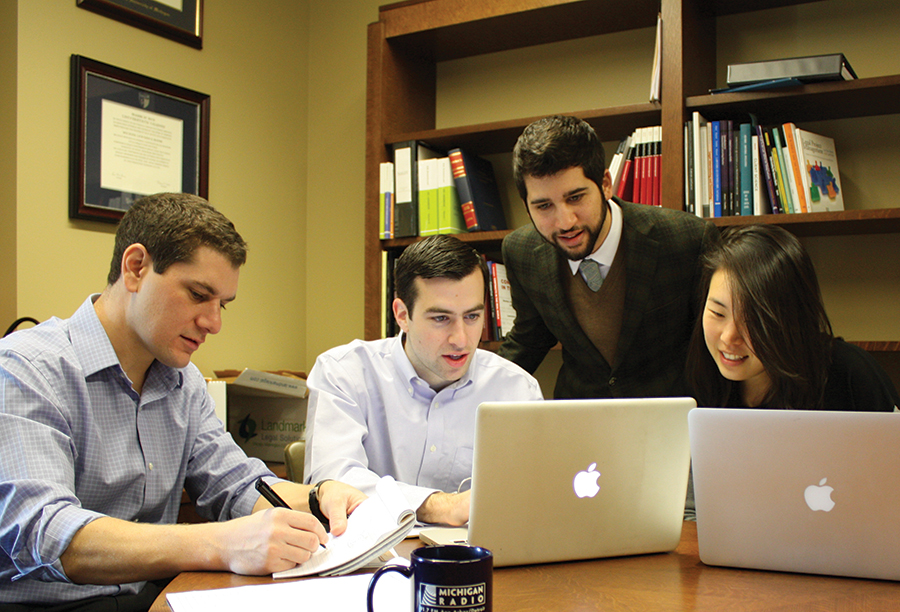The Role of Transactional Law Clinics in Promoting Social Justice
By Leah Duncan
Associate Editor, Vol. 24
 Access to justice is arguably one of the biggest problems facing the legal profession.[1] As Brian Price, director of Harvard Law School’s Transactional Law Clinics, puts it, “[w]hen people try to navigate the legal world without representation, deterred by the cost, they are at a structural disadvantage compared to those who know the rules of the game.”[2] In recent decades, law clinics have played a significant role in addressing the gap in services to clients who lack the means to afford high legal fees. During the early years of legal clinics, most law schools legal clinic offerings focused on civil and criminal litigation. But over the past few years, there has been an increasing instance of transactional clinics which focus on providing legal aid to low-income entrepreneurs, small businesses, and other community-based organizations.[3]
Access to justice is arguably one of the biggest problems facing the legal profession.[1] As Brian Price, director of Harvard Law School’s Transactional Law Clinics, puts it, “[w]hen people try to navigate the legal world without representation, deterred by the cost, they are at a structural disadvantage compared to those who know the rules of the game.”[2] In recent decades, law clinics have played a significant role in addressing the gap in services to clients who lack the means to afford high legal fees. During the early years of legal clinics, most law schools legal clinic offerings focused on civil and criminal litigation. But over the past few years, there has been an increasing instance of transactional clinics which focus on providing legal aid to low-income entrepreneurs, small businesses, and other community-based organizations.[3]
As a tool to solve the access to justice crisis, community organizers use various strategies to empower community members to direct their own future. While civil and criminal litigation clinics have secured their space in the access to justice toolbox, professors, scholars, and students alike have begun to engage in serious dialogue about what role, if any, transactional law clinics can play. Transactional law clinics primarily focus on assisting small businesses and entrepreneurs in business formation, contract drafting and other types of transactions. These transactional law clinics, like the University of Michigan Law Entrepreneurship Clinic, point to the value of free and reduced fee transactional services for small businesses and low-income entrepreneurs who may not otherwise receive legal aid. To this end, this article explores justifications for the inclusion of transactional clinics in the fight for access to justice and provides insight to strategies for its inclusion.
So how exactly do transactional law clinics help promote the aims of community engagement and organizing in the efforts to increase access to justice? Transactional clinics serve a facilitation role. In this role, clinics provide free transactional legal services to community organizers and small businesses in order to foster a connection between the community’s goals and the legal and business avenues to meet these goals. For example, the Housing Initiative Transactional Clinic at the University of Chicago seeks to improve access to affordable housing by supporting nonprofit, community-based affordable housing developers and housing cooperatives in real estate, governance, and tax related issues.[4] In this way, transactional law clinics empower community-based organizations to achieve their objectives by helping them navigate legal obstacles.
The role of the transactional law clinic does not end there. Transactional clinics also serve an educational role for law students. Obviously clinical education is designed to give students a practical experiential supplement to the doctrinal knowledge focus of the classroom. However, transactional law clinics not only provide opportunities for practical legal experience, but they also bridge the gap between students’ desires to work on transactional matters and the need for this form of legal help in many underserved and underrepresented communities. In contrast to the ways in which litigation clinics are viewed, “the diverse spectrum of non-adversarial law practice–the transactional aspect of lawyering whereby clients are represented outside of the courtroom–is rarely thought of as a mechanism for bringing about social justice.”[5] Thus, by exposing students to the nexus between transactional law and social justice, transactional law clinics such as the Housing Initiative Transactional Clinic promote an increased awareness of the ways in which lawyers can use business law to increase access to justice.
While it has not been readily apparent how transactional clinics will continue to develop the incorporation of social justice into their curriculum, it is important to recognize the great potential for a stronger nexus between the two. Law schools and professors should include teachings on the ways transactional law can be used as a means to social justice in both the classroom and clinical contexts. At a very basic level, legal educators can begin by offering seminars on issues such as real estate and affordable housing that would mirror the myriad of course offerings on litigation and social justice. Moreover, transactional law clinics can focus on providing aid specifically to low-income and community-minded entrepreneurs while supplementing this practical experience with in-class instruction on client-centered approaches to working with community-based organizations and small business owners. As practitioners, educators, and students continue to use the transactional law clinic as a vehicle for promoting social justice, the idea that transactional law not only has a place, but is necessary to increasing access to justice will be reinforced.
[1] Elizabeth Carr, No Justice for Most: Brainstorming to improve access to justice, Harv. L. Today (Nov. 16, 2017), https://today.law.harvard.edu/no-justice-brainstorming-improve-access-justice/
[2] Id.
[3] Jared Nicholson, Offering Transactional Legal Aid to Low-income Entrepreneurs, Ind. J. of L. and Soc. Pol’y, Winter 2018, at 1, 1. https://www.repository.law.indiana.edu/cgi/viewcontent.cgi?article=1075&context=ijlse (pg. 2)
[4] The Univ. of Chi. Law Sch., Housing Initiative Transactional Clinic, https://www.law.uchicago.edu/clinics/mandel/housing
[5] Lynnise E. Phillips Pantin, The Economic Justice Imperative for Transactional Law Clinics, 62 Vill. L. Rev. 175, 178 (2017) https://digitalcommons.law.villanova.edu/cgi/viewcontent.cgi?referer=https://www.google.com/&httpsredir=1&article=3341&context=vlr.
